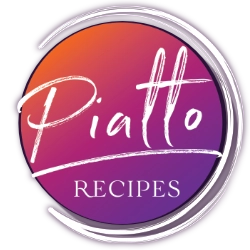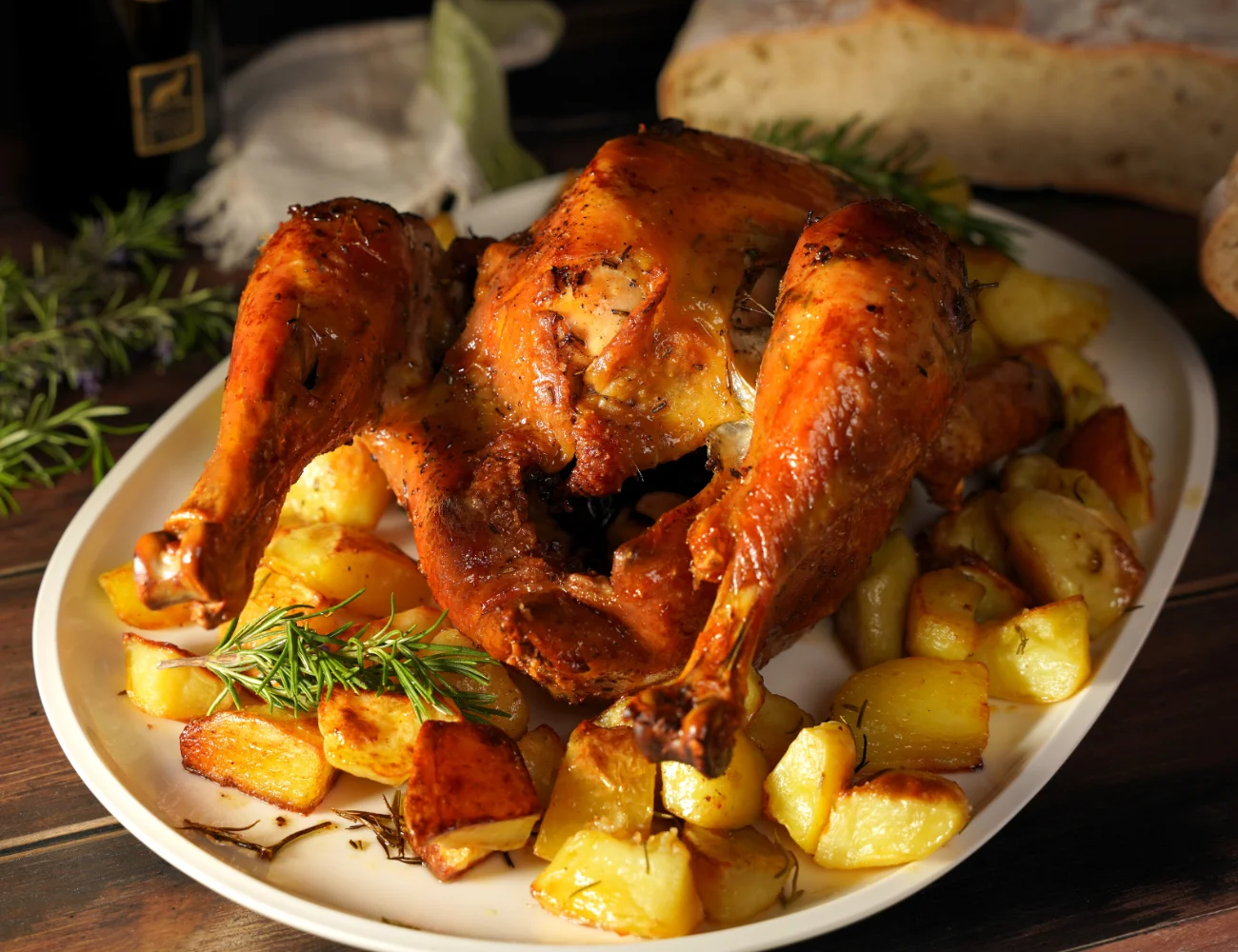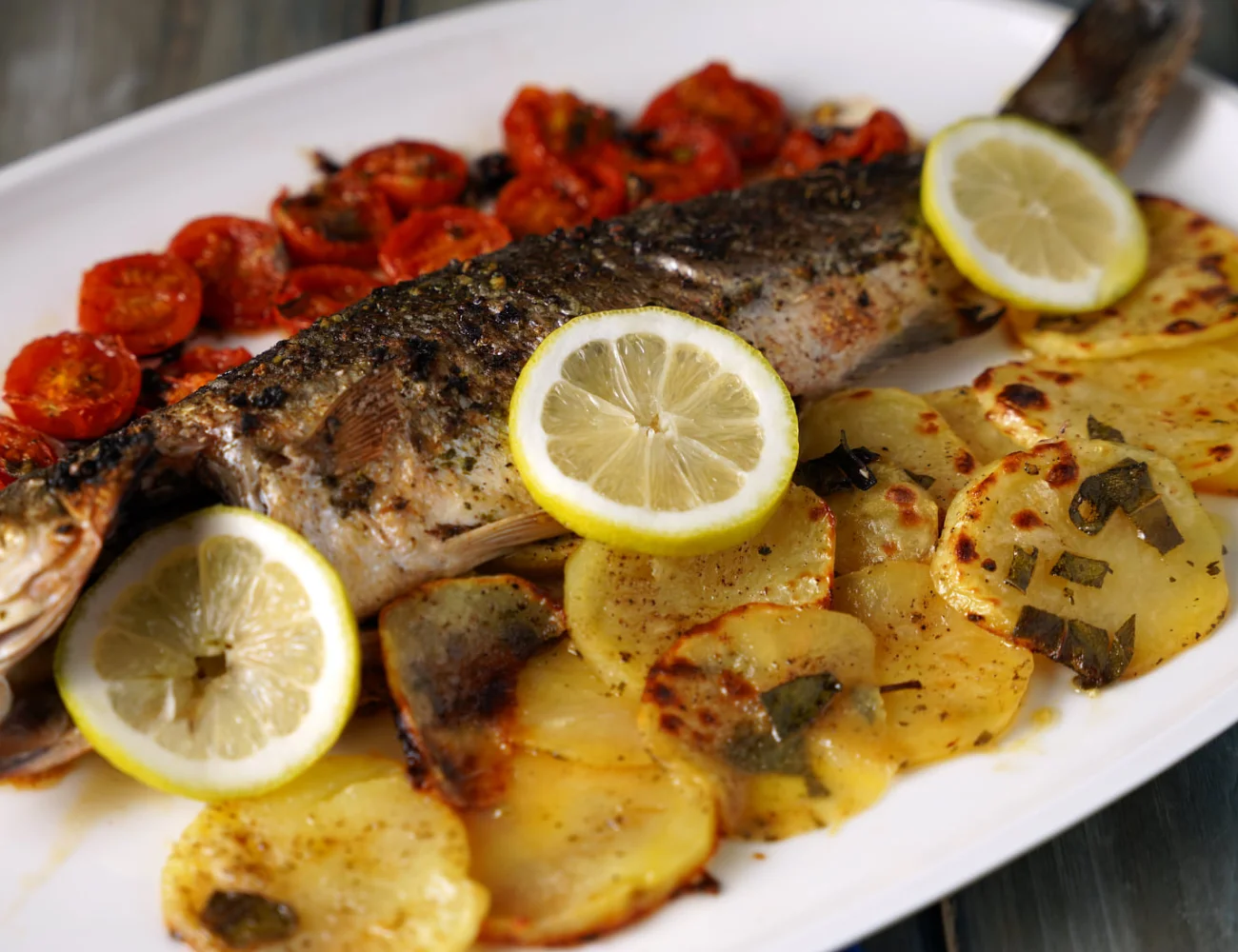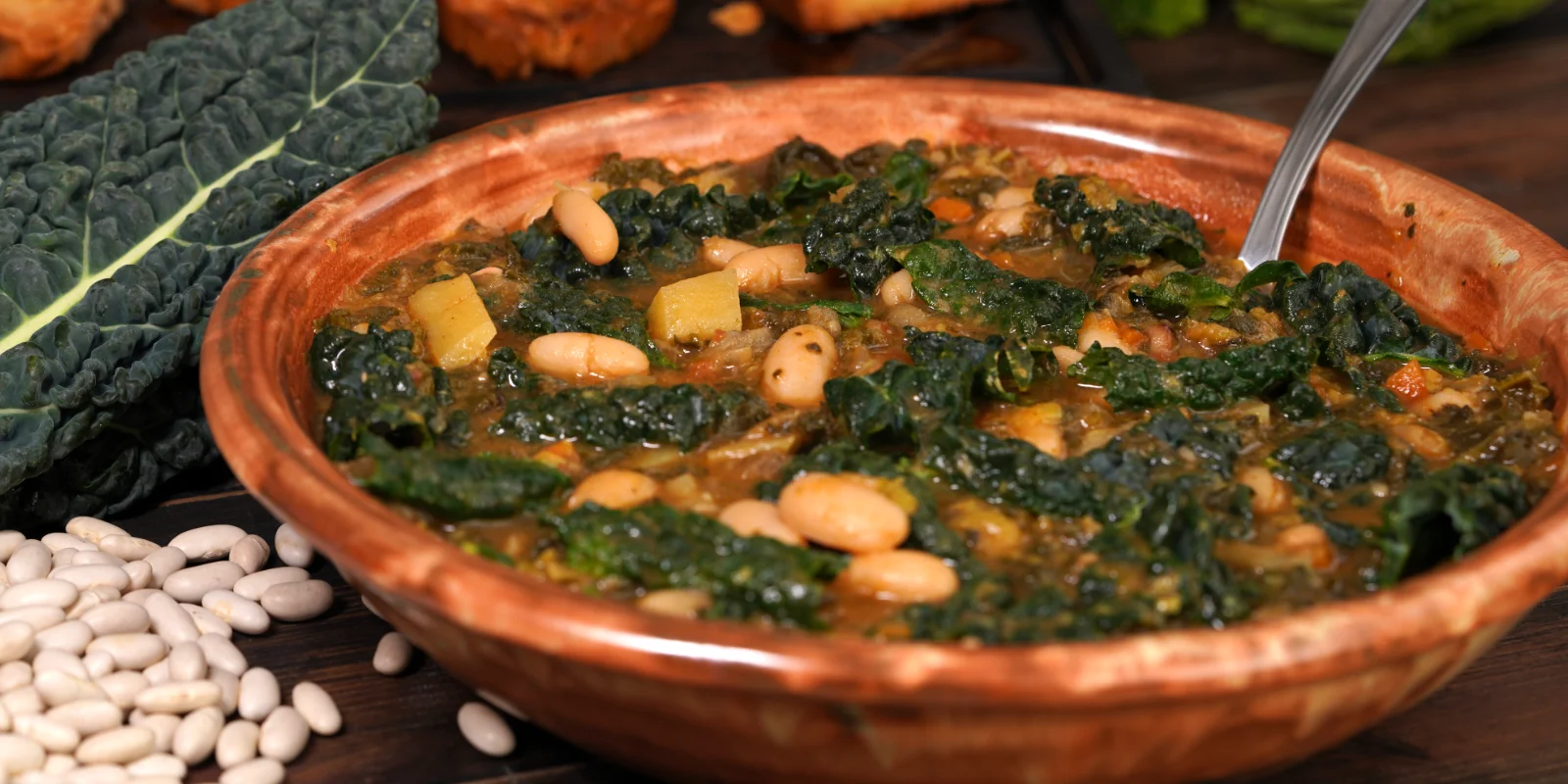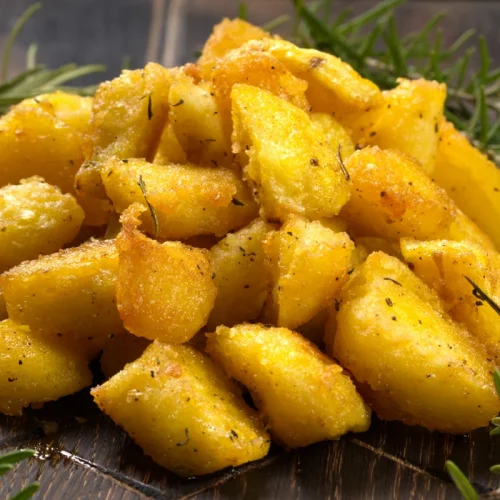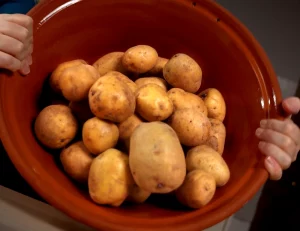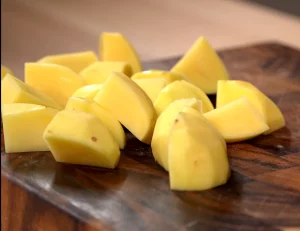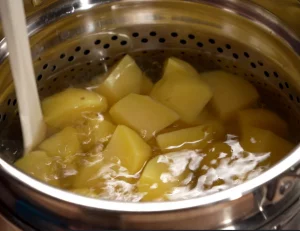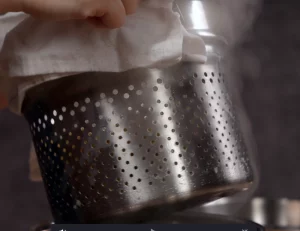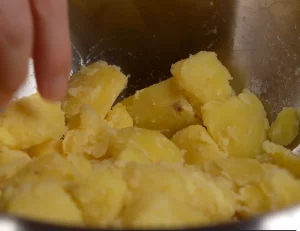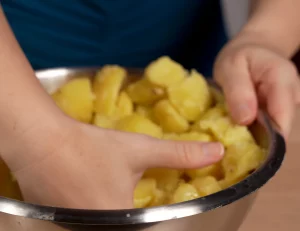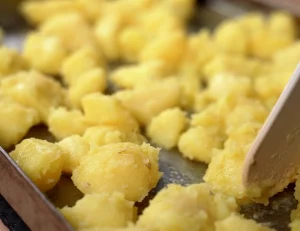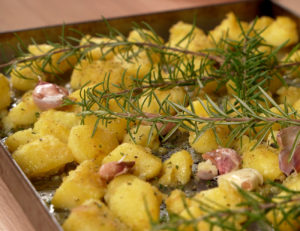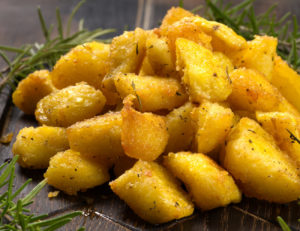Today we’re on a quest for the ultimate crispy roasted potatoes. You know, the kind of potatoes so perfectly golden and crunchy, you can’t stop reaching for just one more!
Here’s a quick look at our roadmap for achieving perfectly crispy oven roasted potatoes:
- Choose the right potato—high starch (15-20%)
- Cut the potatoes to the right size—to maximize external surface area for the crisp and internal fluffiness
- Parboil then dry the potatoes in salted water
- Rough up the potatoes—and coat them with the right amount of oil or fat
- Add fat in the right quantity
- Preheat the oven—with oiled baking sheet inside
- Salt and roast those potatoes—at a roaring high 425°F (220°C), not stirring to frequently
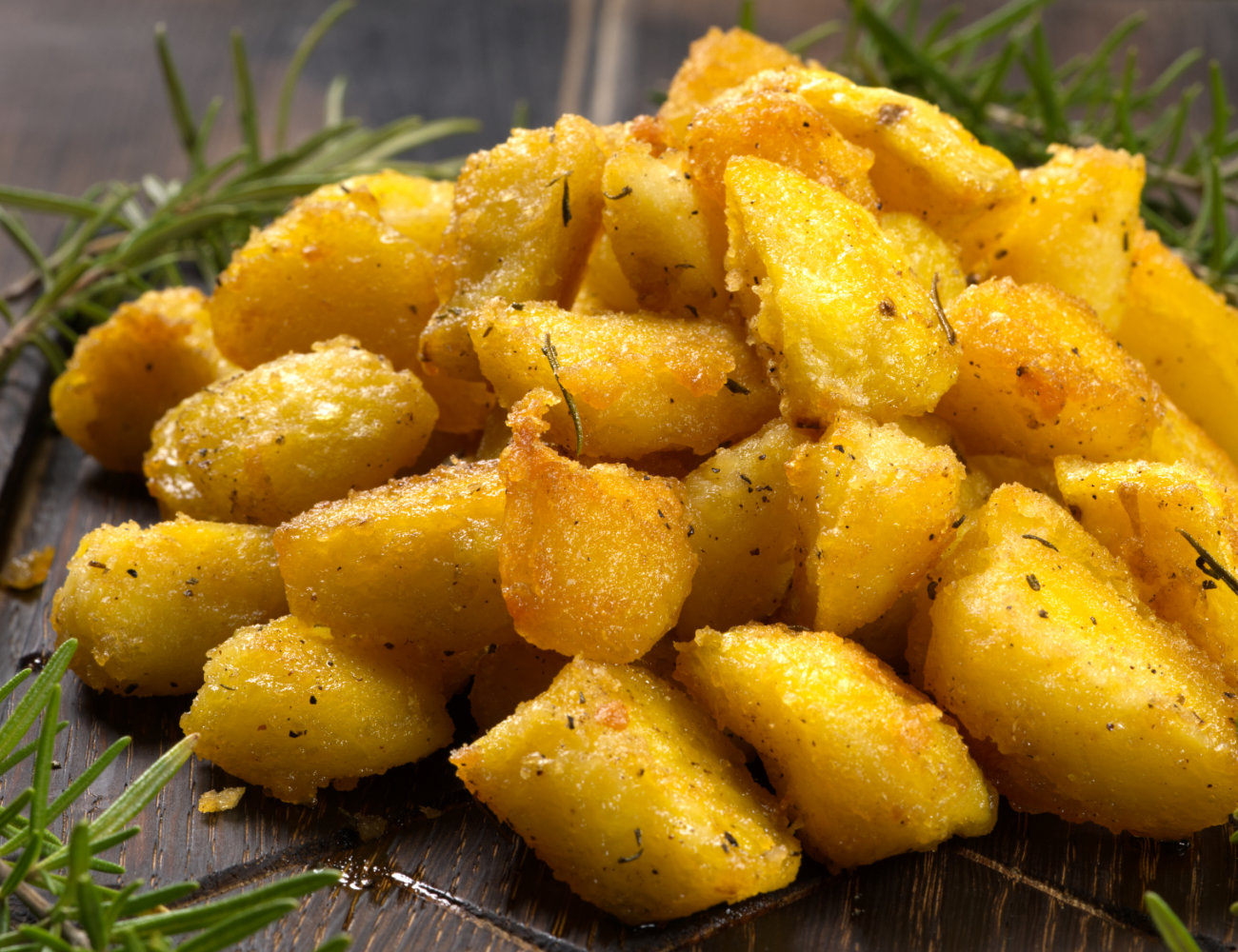
Watch the Video Recipe!
Crispy Roasted Potatoes, the video recipe:
Subscribe to our YouTube Channel
More video recipes? Subscribe to our YouTube Channel (it’s FREE) and click the bell to get notifications when we release a new video recipe!
#1: Choose the Right Potatoes: High Starch!
Let’s talk about how to pick the right potato for roasting because not all potatoes are created equal. What you’re looking for is high starch content. Don’t get distracted by color— all we care about is starch. There are no hard and fast rules to distinguish a high starch potato from one that isn’t—including color. Some yellow potatoes have a high level of starch and some will never, ever get crispy in the oven due to their low starch. We’ve made some crispy roasted purple potatoes that blew our minds. So, again, color alone won’t tell you anything.
Ideally, we want a potato with 15%- 20% starch— That’s the sweet spot for delivering that coveted crispy exterior and a fluffy interior. The 20% will deliver the ultimate crisp, but likely be a bit dry inside for some tastes. Between 15-20%, a potato can become crispy but still remain a bit buttery tasting inside.
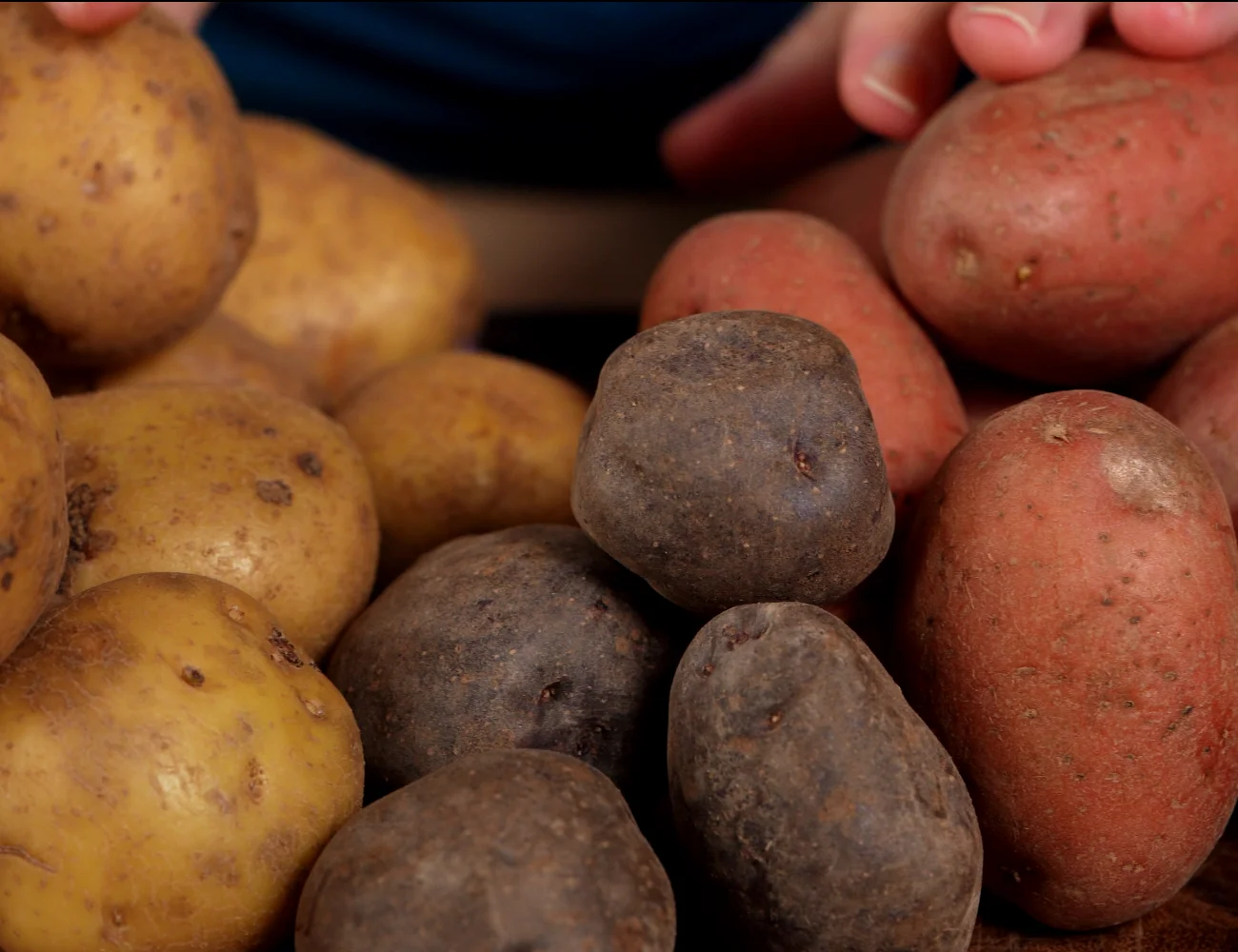
Really High Starch Potatoes: 20%
In the United States, Russet and Idaho are among the famous high starch potatoes. In Europe? Agria, King Edward and Maris Piper are great super high-starch choices. These kinds of potatoes are the right choice for those who prioritize crispiness over all else.
Medium-High Starch Potatoes: 15-20%
Potatoes like Yukon Gold are the right choice for those who want a crispy potato, but are ok sacrificing a little crisp for a bit more flavor. The center of crispy roasted potatoes made with potatoes at this starch level tend to be more ‘buttery’ and ‘nutty’ inside.
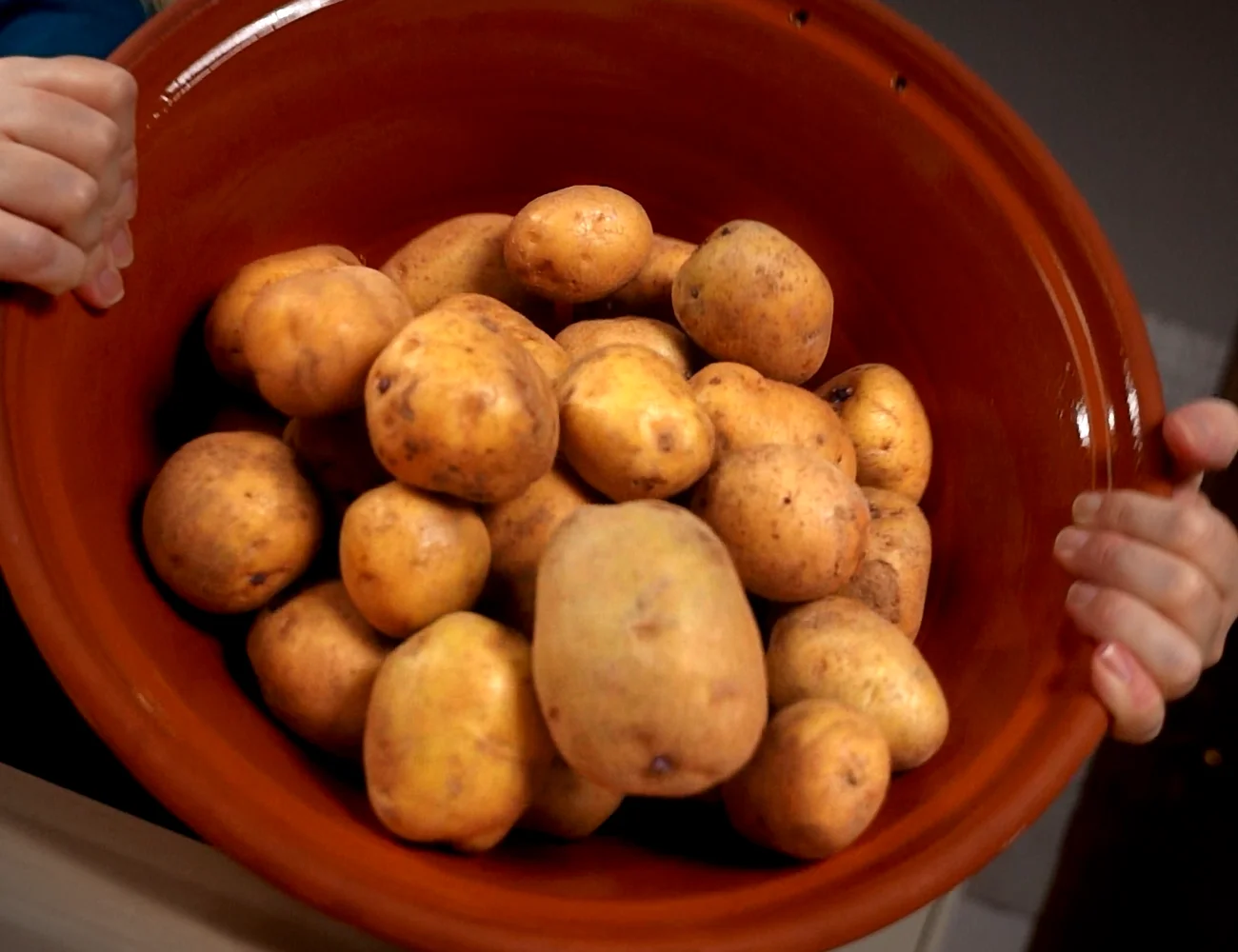
Determining Potato Starch Levels
There are over 5000 of potato varieties in the world. We won’t lie: it’s tough to find information about starch levels for all of the potatoes you’ll encounter at your grocery or supermarket! Oftentimes, a potato producer will note on the package of a potato is good for roasting—but sometimes they also lie or generalize too much. In Italy, many yellow potatoes have packaging that boast they are great for ‘roasting’—and they may be tasty as roasted potatoes, but do not have enough starch to every get crispy.
Yet, a quick internet search will often uncover the starch level—either on a distributors’ or potato company’s website.
#2 Cut the Potatoes to the Right Size for Crispy Roasted Potatoes
Once you’ve picked your high-starch champions, it’s time to peel and cut up your spuds. Size is rather important here. We want to aim for…
- roughly evenly sized potatoes
- cut into cubes or wedges of about
- 1.5-2″ (4-5 cm)
This size maximizes surface area. You can go a little smaller if you are using a 20% starch potato (which won’t lose much water). However, don’t go bigger: the amount of crisp won’t stand up to the fluffy potato inside.
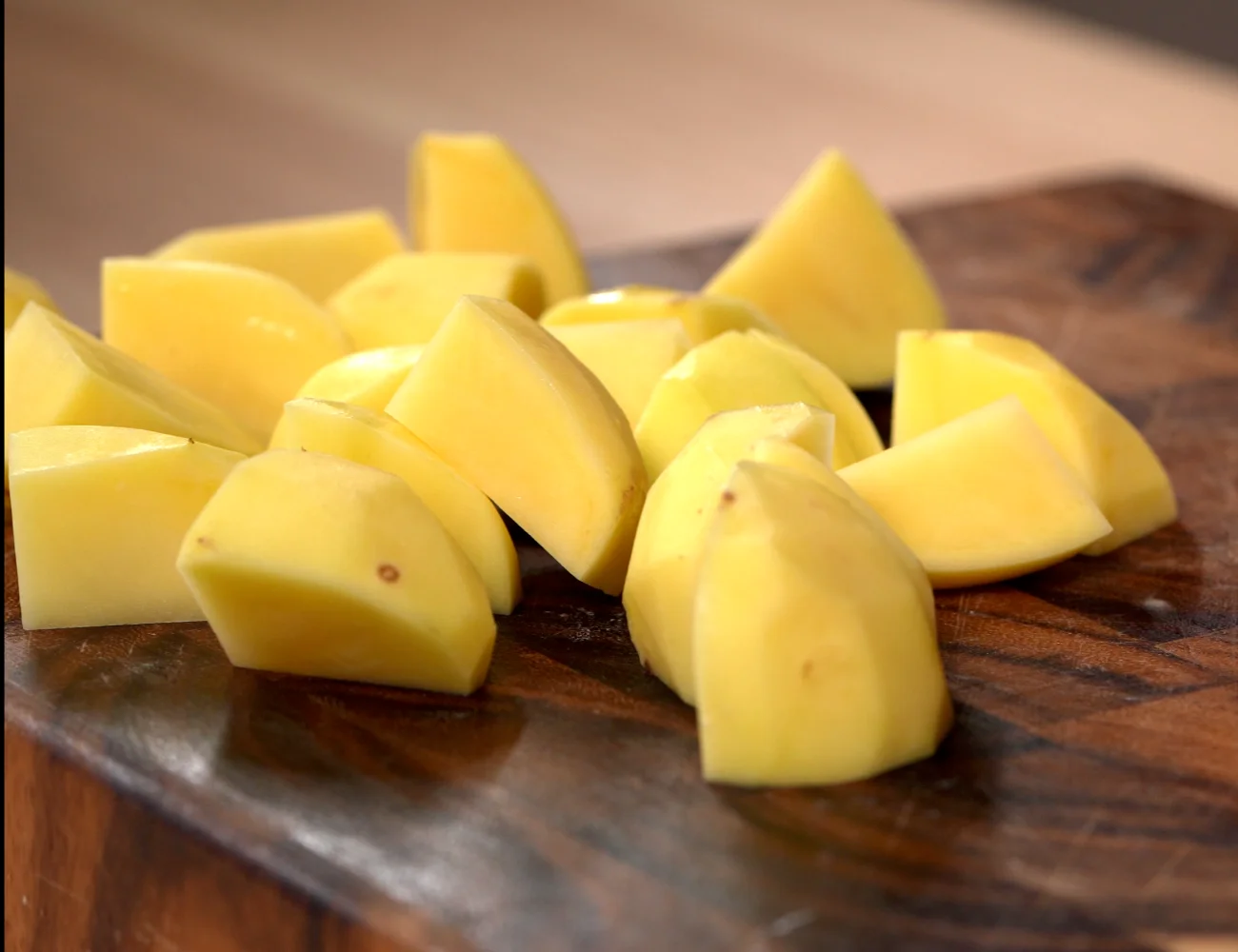
#3 Parboil the Potatoes (Pre Cooking Matters!)
It might surprise you to learn that the best way to make the ultimate crispy roasted potatoes is to pre-cook them! To pre-cook, we want to add the cut potatoes to salted, boiling water. Then we wait for the potatoes to start boiling and cook them for 5 minutes. After that, we drain the potatoes and move to step #4 —roughing them up!
There are two reasons we want to pre-cook the potatoes:
- To remove excess surface starch
- To soften the outside so we can give the exterior of the potato texture (which makes them crispier)
There is a difference between interior and surface starch. When we cut potatoes, we are left with excess starch on the surface of the potatoes. If this starch remains and hits the hot fat, it usually creates a gummy… leathery surface. This is the not crispy roasted potatoes texture we are searching for!
Also, by pre-cooking the potatoes, we soften the outsides of the potatoes. This lets us (in step #4) to rough up the outsides, creating ridges which will better crispy up in the oven.
Note: by salting the water, we give the potatoes some needed seasoning inside.
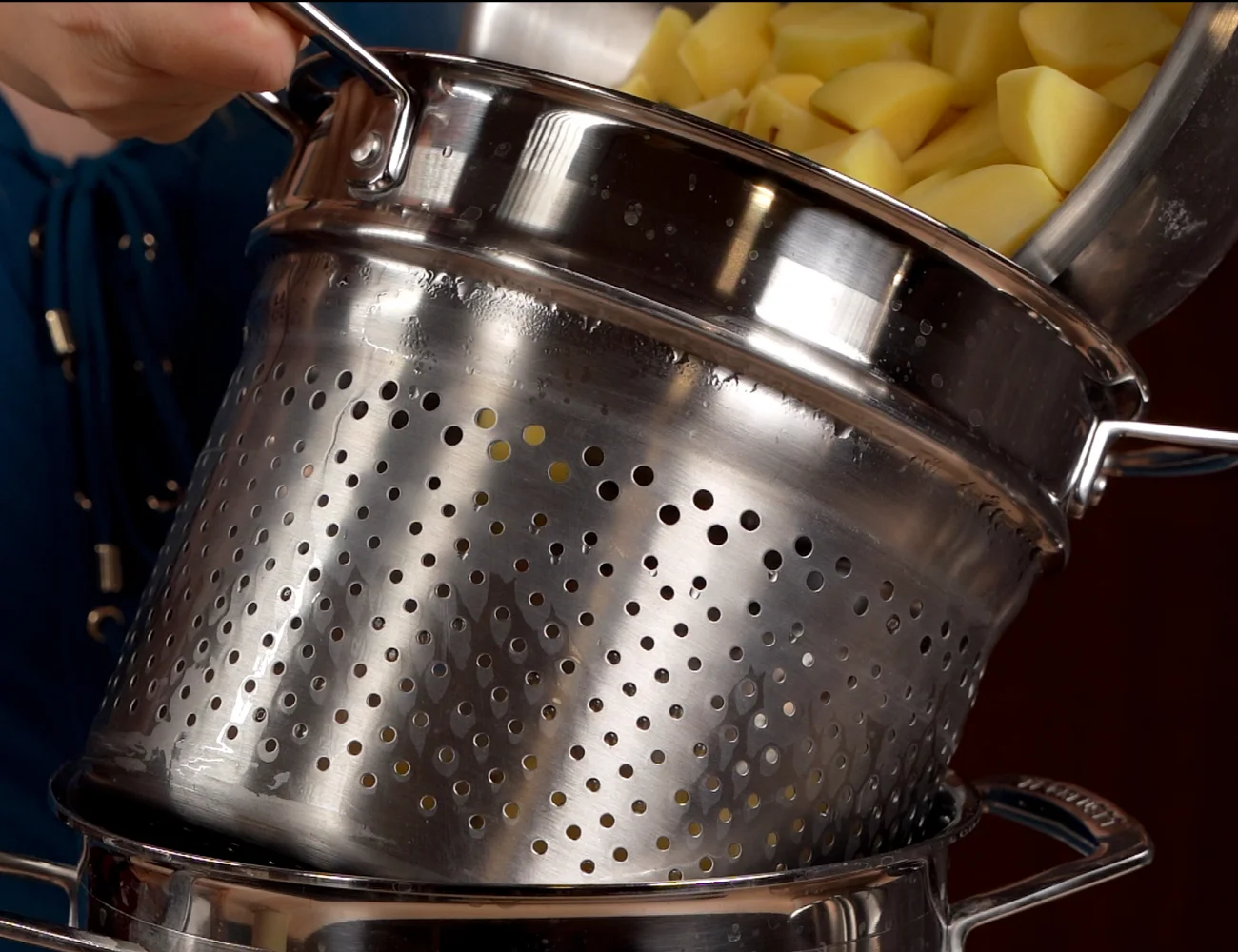
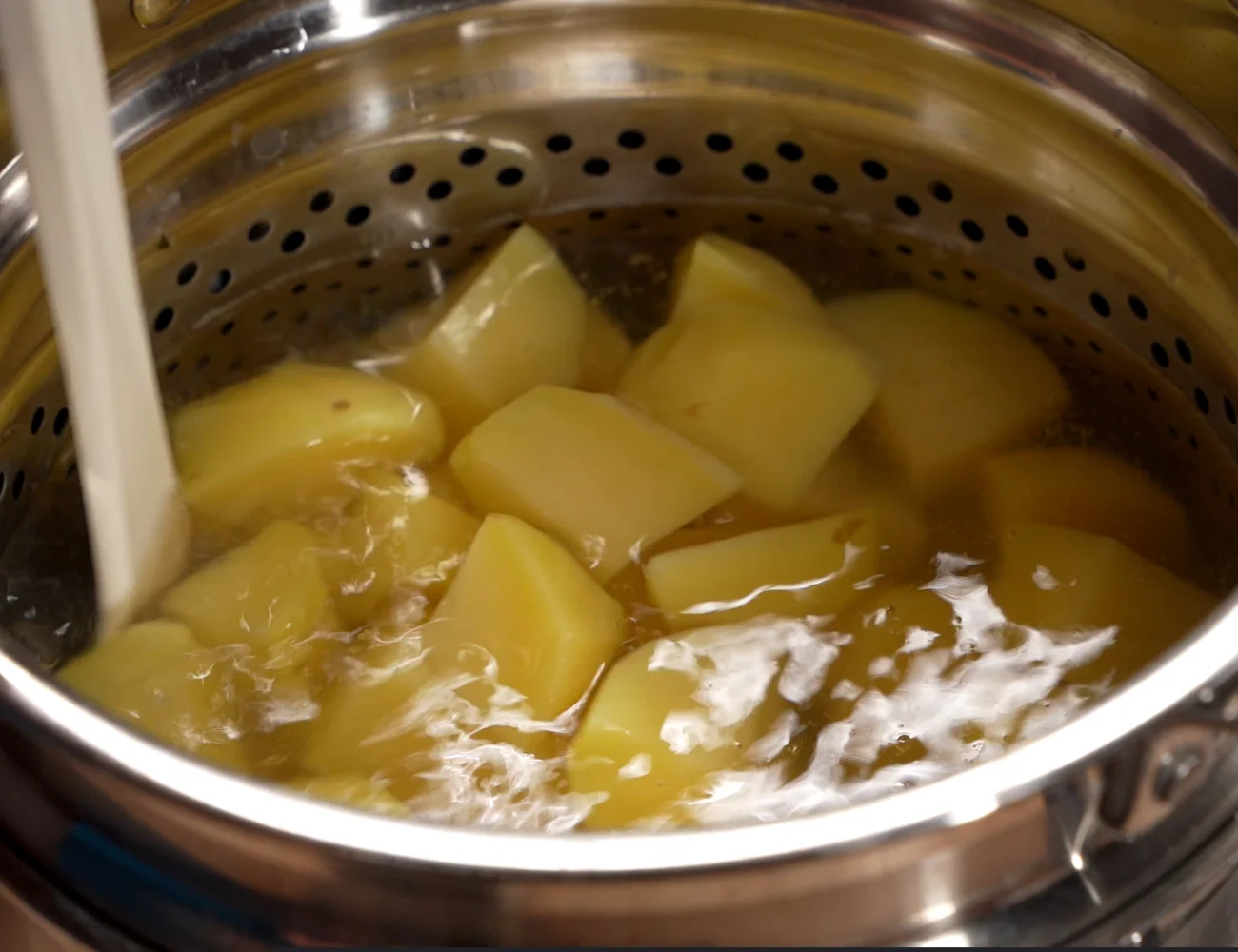
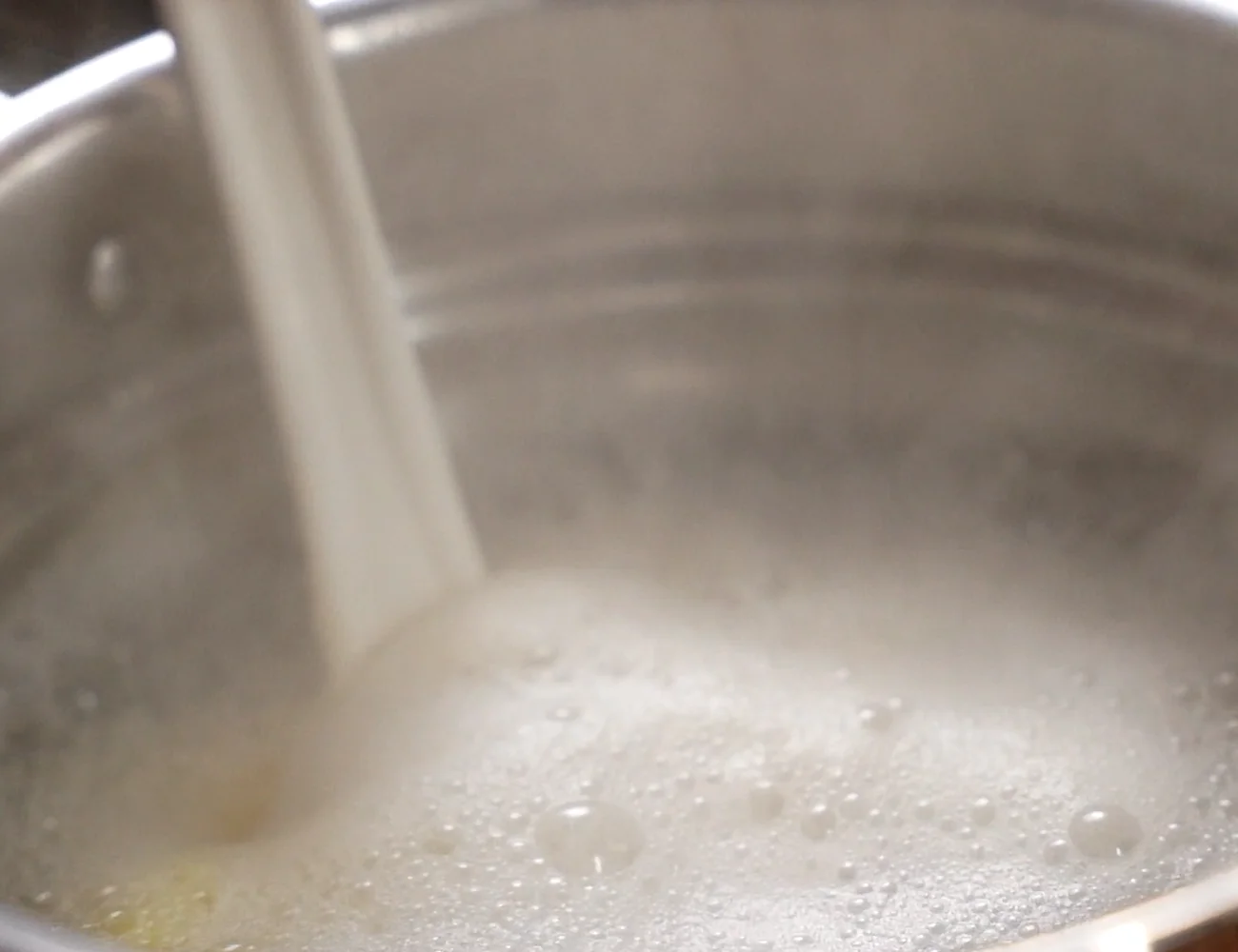
#4 Rough Up the Potatoes!
People love tater tots and ‘au-gratin’ foods exactly because of the textured surface. By parboiling, we now have the chance to create that surface on our roasted potatoes. Transfer the par-boiled potatoes to a colander (if they aren’t in one already) and then gently shake. The shaking process helps to dry them out some and to create the lovely exterior texture.
After shaking the potatoes, we want to just leave them be. Let them cool before handling them too much. When still hot, the potatoes will be more prone to falling apart. Once they are cool, we can move to the next important step….
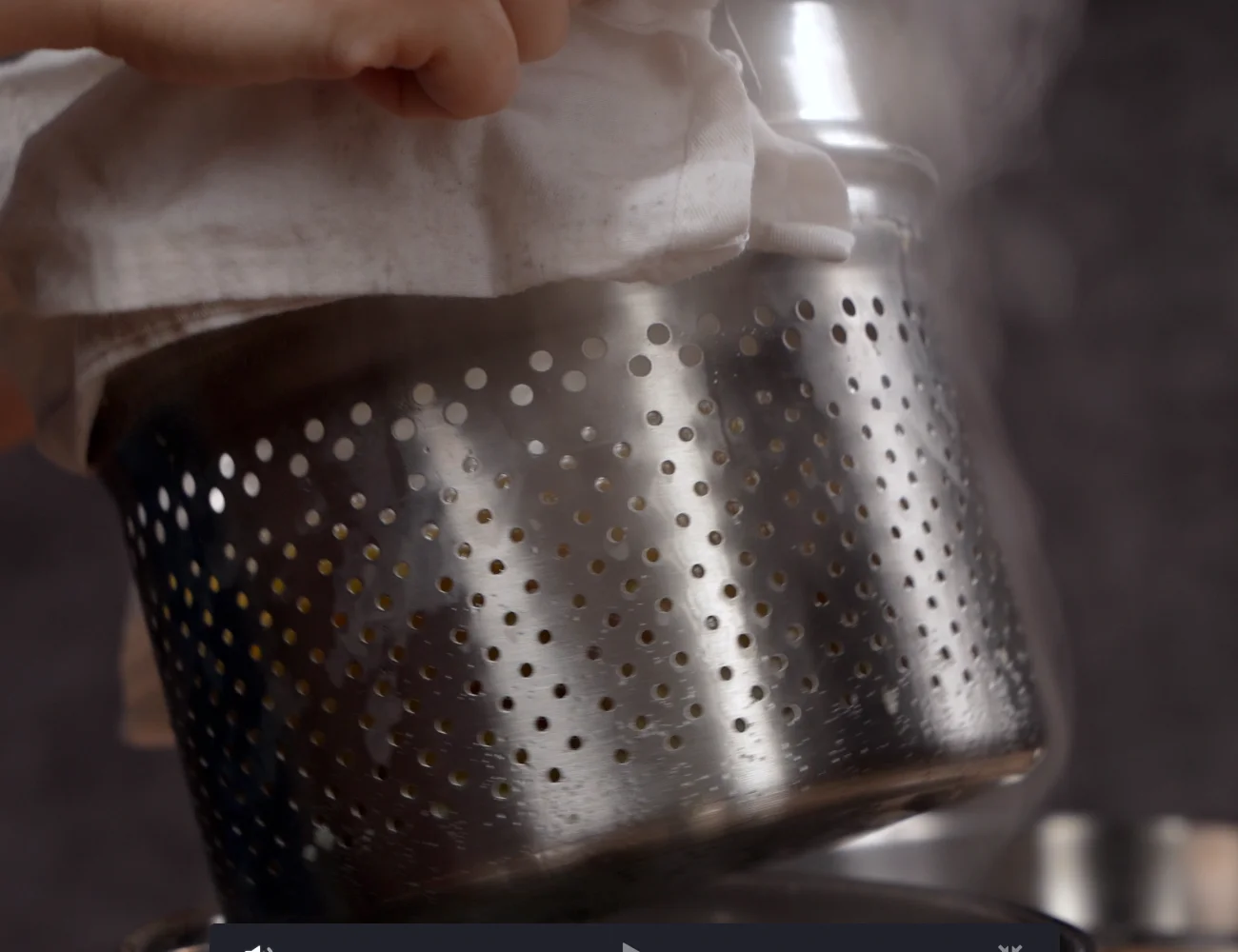
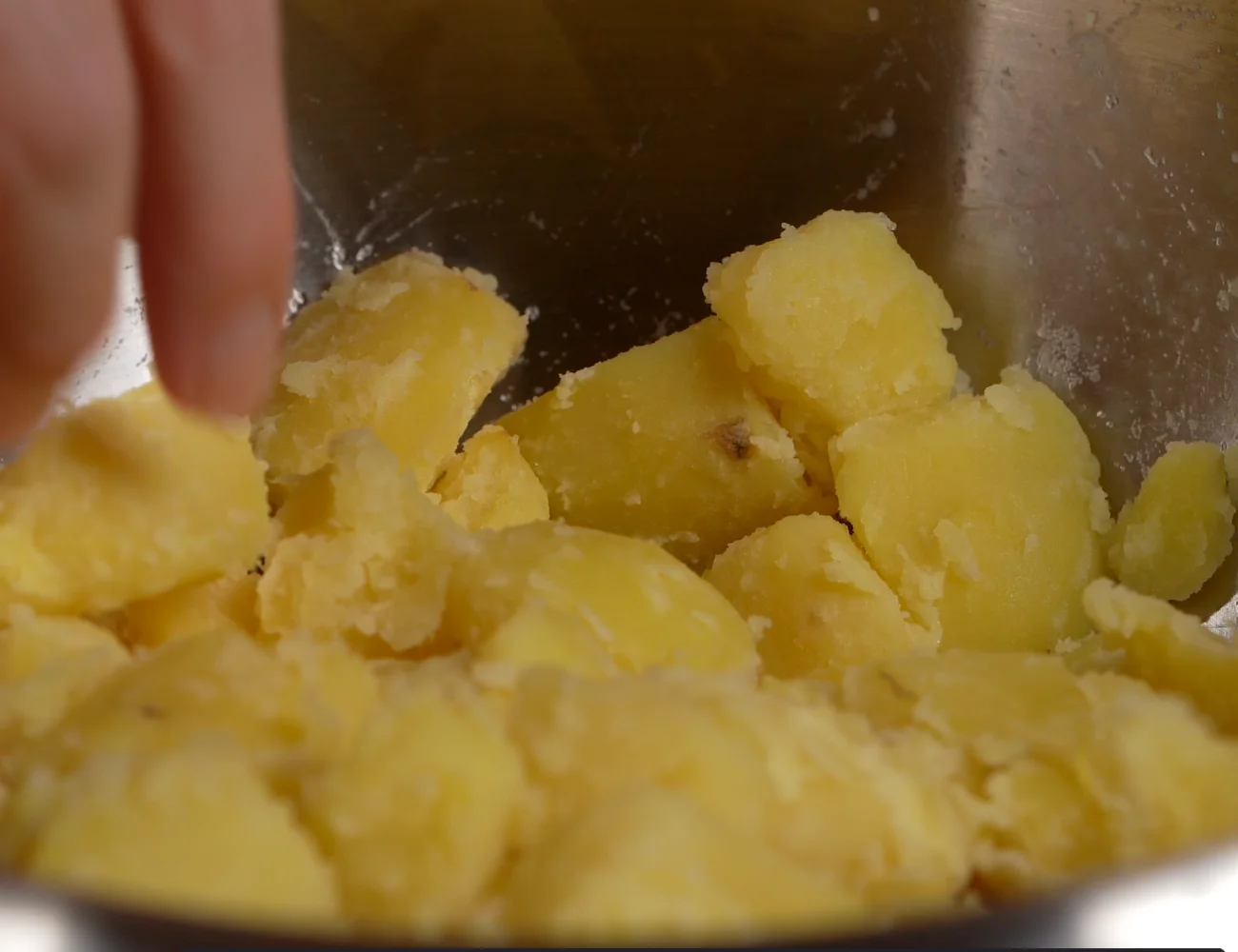
#5 Add the Fat
Once our potatoes are cool and dry, it’s time to add the fat! We can’t have crispy roasted potatoes without it.
Most fats and oils can work… olive or peanut oil, clarified butter, or even duck fat. The saturated fat in the clarified butter and duck fat will usually produce the crispiest oven roasted potatoes. However, we often use olive oil as is the Italian tradition.
But how much oil or fat is needed? It’s easy to fall into the trap of thinking the more fat the crispier the roasted potato… but that’s not how it works.
Instead, about 2 tablespoons of oil (or melted fat) for every pound of potatoes. Gently coat the surfaces of your potatoes by mixing them with the oil in a bowl. For best results, you’ll want to lightly grease the baking sheet you’ll be using and pre-heat that in the oven as well.
Drizzle the melted fat or oil onto the potatoes and use your hands to gently mix them in a bowl. Be sure that all surfaces of each potato are lightly greased.
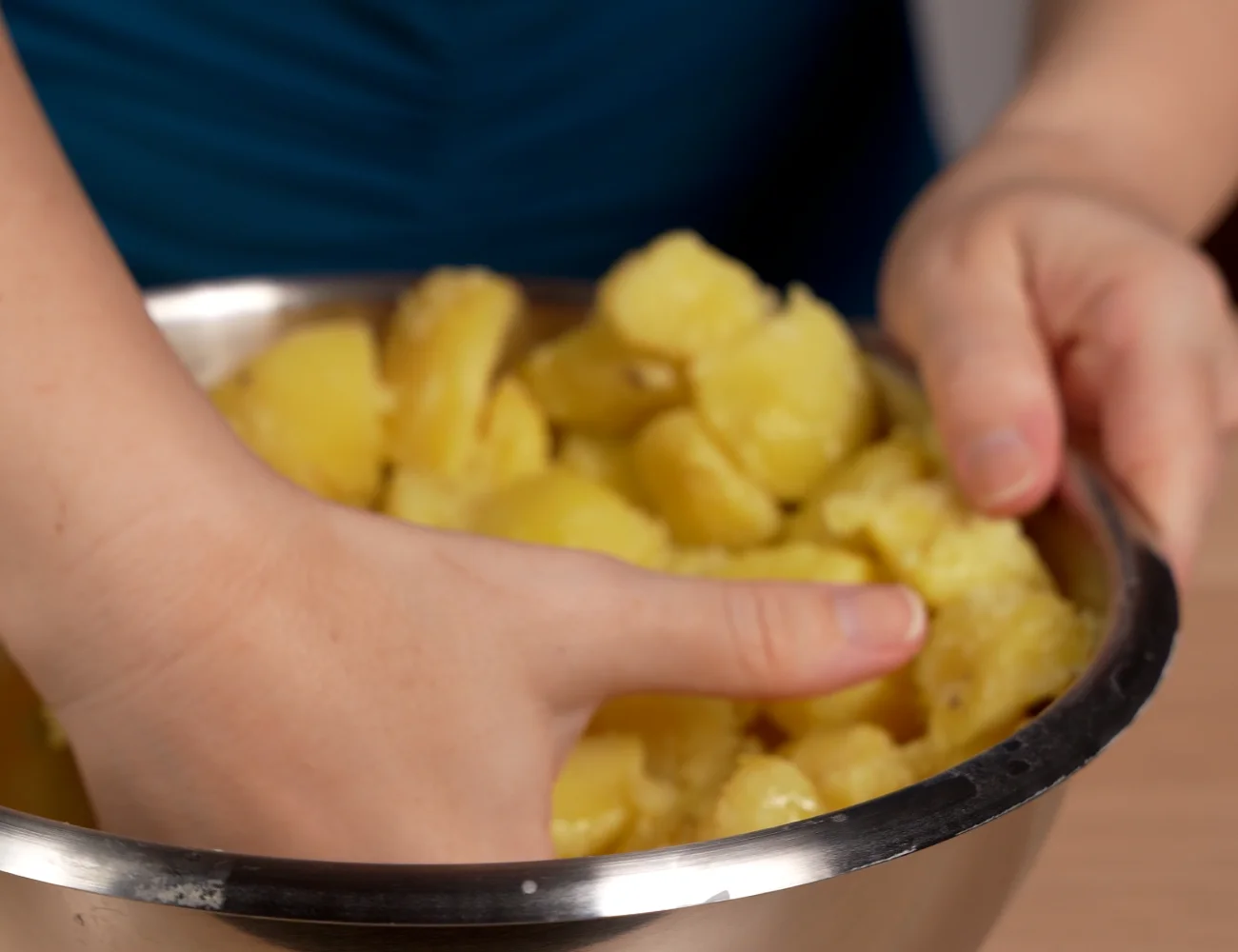
#6 Salt and Roast the Potatoes
Preheat the oven—with the oiled baking sheet inside— to 430° F (220°C), fan. If you prefer to use the ‘static’ setting (or your oven has no fan/convection), pre-heat the oven to 450° F (235°C).
When the oven reaches temperature, add the potatoes to the hot, oiled baking sheet. Salt them at this time. Spread the potatoes out in one layer to maximize the crisp. Roast the potatoes for about 40 minutes in total.
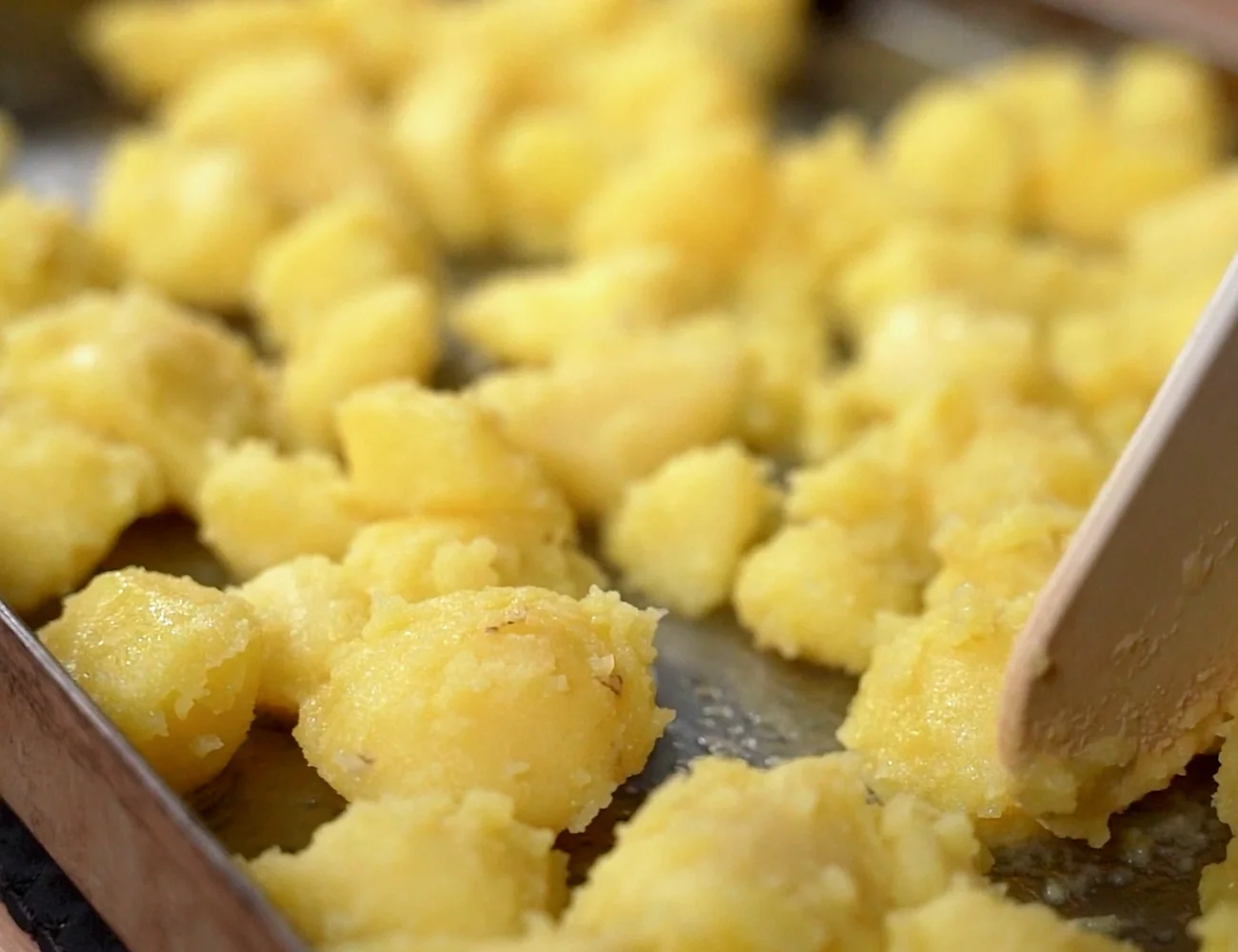
After the first 20 minutes, remove the potatoes and turn them over. It’s also the right time to add any fresh garlic or seasonings like herbs. We typically add several cloves of garlic (smashed, left in the skins) and some minced rosemary along with a few sprigs as well.
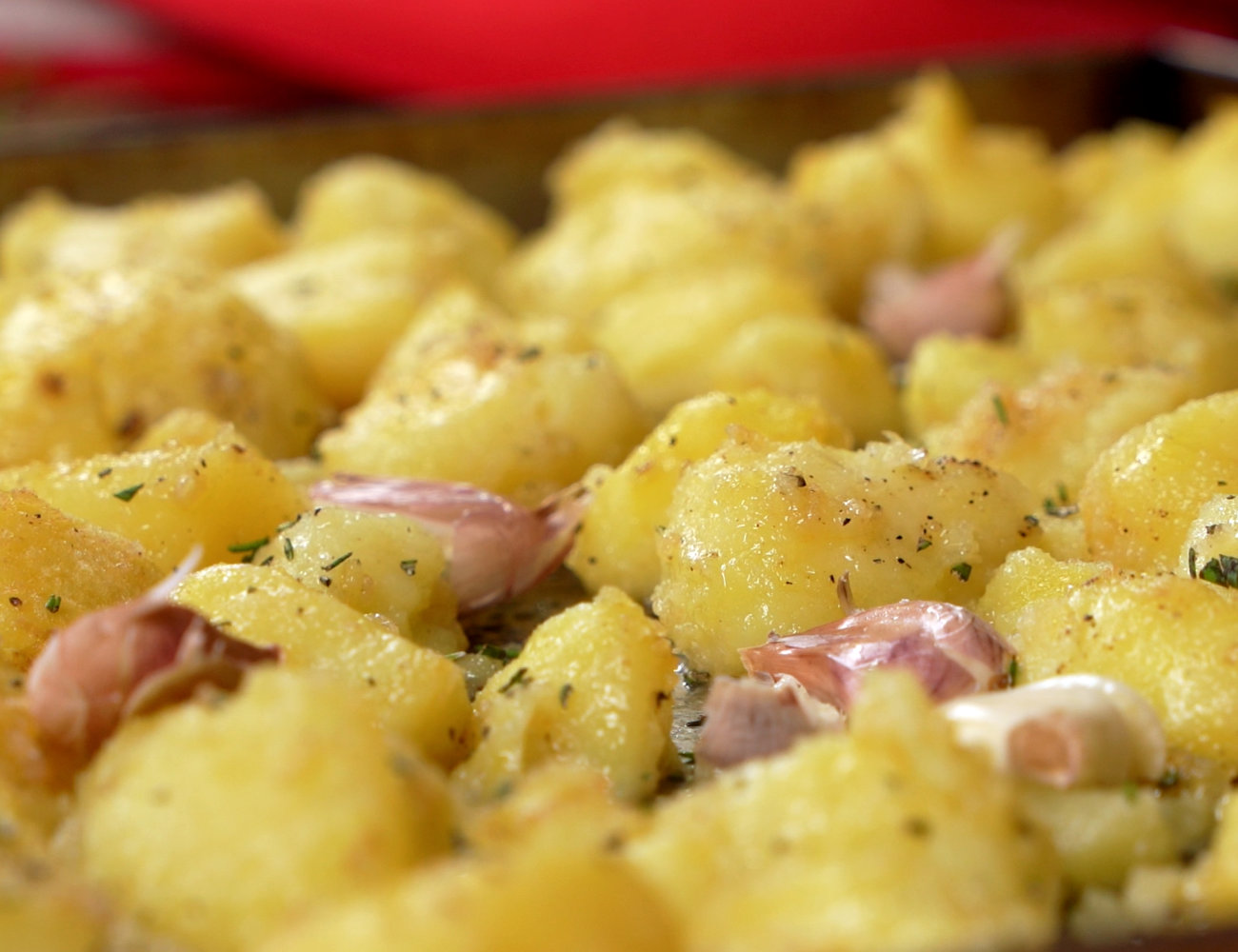
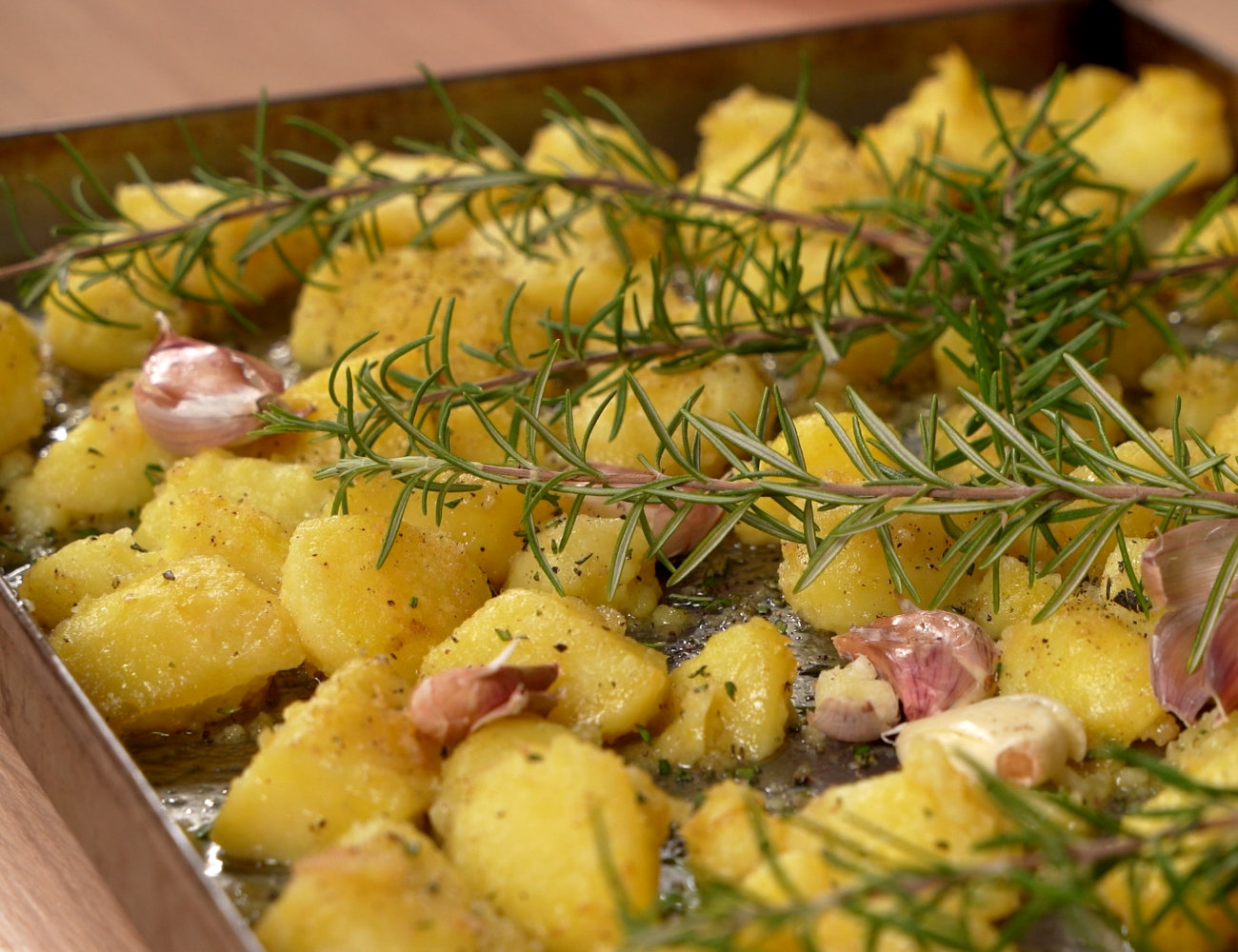
We add the garlic and herbs at this time so that they do not burn at the high oven temperature.
If you are fine babysitting the potatoes, you may want to flip them every 10 minutes for the last 20 minutes of roasting.
Buon appetito!
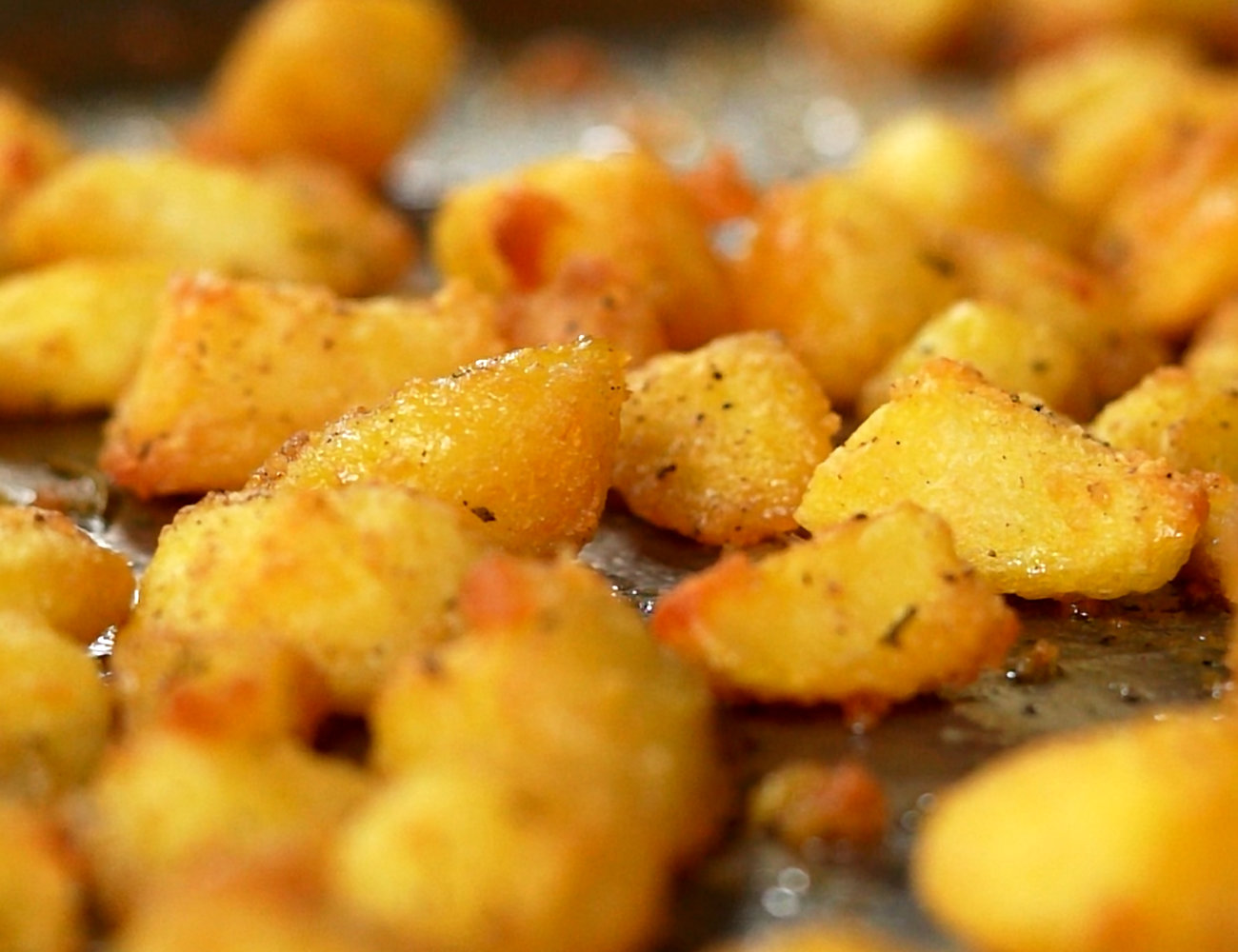

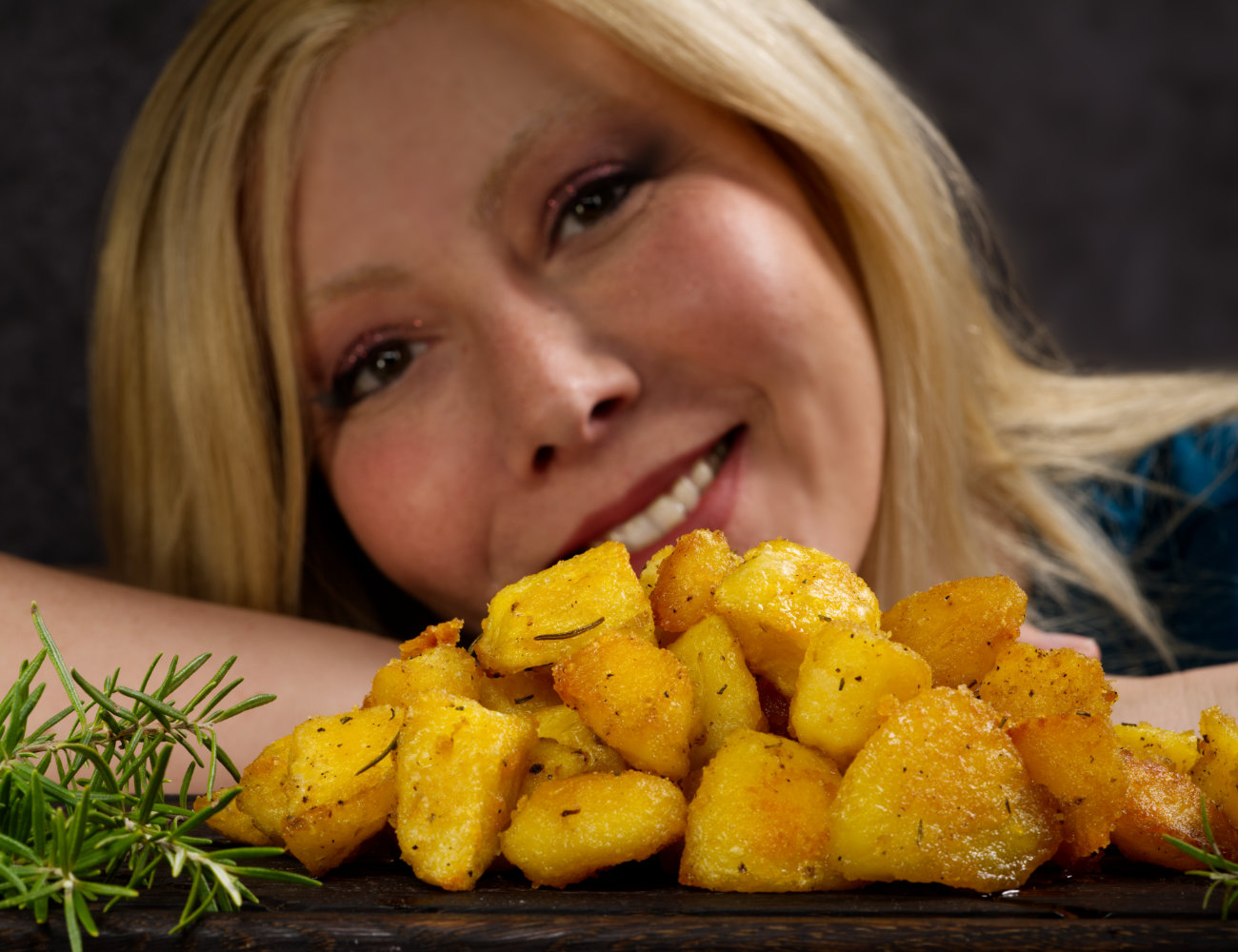
Products We Use in the Video (or Recommend)
Amazon Affiliate links:
Other Affiliate links:
Learn more about why we think this knife is one of the best all-purpose kitchen knives in our guide!
We are affiliates of Nakano and receive a small commission if a purchase is made using our links or discount codes. That said, we only choose accept affiliate partnerships with products we use or believe in.
As an Amazon Associate, we earn from qualifying purchases. This means at no extra cost to you, PIATTO may earn a small commission if you click the links and make a qualifying purchase.
More Recipes with Potatoes!
How to Make Crispy Roasted Potatoes That Are Totally Addictive!
Equipment
- 1 colander for roughing up exterior of potatoes after parboiling
- 1 Large Pot for parboiling the potatoes
Ingredients
- 3 lbs potatoes with 15%- 20% starch; 20% starch will be crispiest but a bit dry (Russet, Idaho). 15% will be a bit less crispy but more buttery inside (Yukon Gold)
- 6 tbsp olive oil or: peanut oil, clarified butter, duck fat…
- fine salt to taste
- black pepper to taste
- coarse salt for salting the water during parboiling
Seasonings
- 6 cloves fresh garlic
- 5 sprigs rosemary
Instructions
Select the Right Potatoes
- Ideally, we want a potato with 15%- 20% starch— That’s the sweet spot for delivering that coveted crispy exterior and a fluffy interior. The 20% will deliver the ultimate crisp, but likely be a bit dry inside for some tastes. Between 15-20%, a potato can become crispy but still remain a bit buttery tasting inside. See the article for varieties that fall in these starch ranges.3 lbs potatoes

Cut the Potatoes the Right Size
- Peel and cut the potatoes. Size is rather important here. We want to aim for roughly evenly-sized potatoes, cut into cubes or wedges of about 1 ½-2″ (4-5 cm).

Parboil the Potatoes
- Parboil (pre cook) the cut potatoes to salted, boiling water. Wait for the potatoes to start boiling and cook them for 5 minutes.coarse salt

- Transfer the par-boiled potatoes to a colander (if they aren’t in one already) and then gently shake. The shaking process helps to dry them out some and to create the lovely exterior texture.After shaking the potatoes, we want to just leave them be.

- Let them cool before handling them too much. When still hot, the potatoes will be more prone to falling apart. Once they are cool, we can move to the next important step….

Add the Fat
- Use about 2 tablespoons of oil (or melted fat) for every pound of potatoes. Gently coat the surfaces of your potatoes by mixing them with the oil in a bowl. For best results, you’ll want to lightly grease the baking sheet you’ll be using and pre-heat that in the oven as well.Drizzle the melted fat or oil onto the potatoes and use your hands to gently mix them in a bowl. Be sure that all surfaces of each potato are lightly greased.6 tbsp olive oil

Roast the Potatoes
- Preheat the oven—with the oiled baking sheet inside— to 430° F (220°C), fan. If you prefer to use the ‘static’ setting (or your oven has no fan/convection), pre-heat the oven to 450° F (235°C).When the oven reaches temperature, add the potatoes to the hot, oiled baking sheet. Salt them at this time. Spread the potatoes out in one layer to maximize the crisp.fine salt

- Roast the potatoes for about 40 minutes in total. After the first 20 minutes, remove the potatoes and turn them over. It’s also the right time to add any fresh garlic or seasonings like herbs. We typically add several cloves of garlic (smashed, left in the skins) and some minced rosemary along with a few sprigs as well.black pepper, 6 cloves fresh garlic, 5 sprigs rosemary

- Finish roasting the potatoes. You may want to flip them every 10 minutes for the last 20 minutes of roasting.

